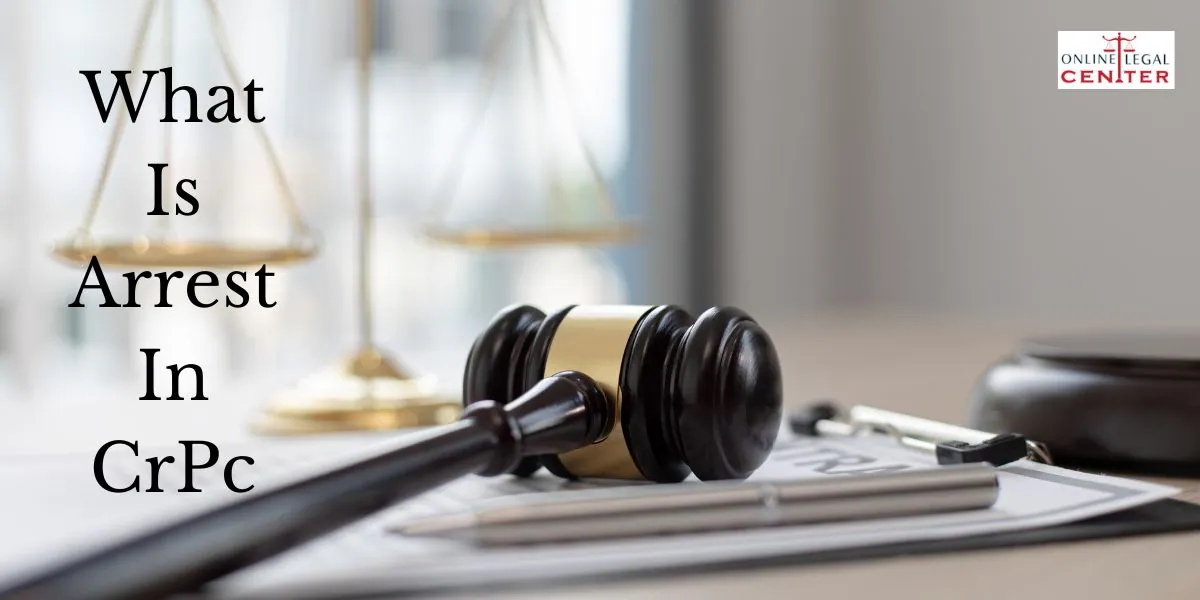What Is Arrest In CrPc: Arrest is a pivotal process within the Criminal Procedure Code (CRPC) that plays a crucial role in the criminal justice system. In this article, we will delve into the various aspects of what constitutes an arrest within the framework of the CRPC.
Arrest Defined
An arrest, in its most fundamental sense, refers to the apprehension of an individual by legal authority due to their involvement in a criminal offense. This process is a significant step in the criminal justice system and allows for the lawful detention of an individual for further investigation.
Grounds for Arrest
Arrests under the CRPC can occur on two primary grounds. The first is when a cognizable offense has been committed, allowing the police to arrest without a warrant. The second is when a warrant has been issued by a competent authority, authorizing an individual\’s arrest.
Arrest Warrant vs. Warrantless Arrest
Arrests that occur with a warrant involve a formal document issued by a magistrate or judge, providing legal permission to take an individual into custody. In contrast, warrantless arrests are made without a warrant and are usually carried out by police officers.
Legal Procedures Surrounding Arrest
The CRPC outlines the legal procedures that govern arrests in India. These procedures differ depending on whether the arrest is conducted by police officers or magistrates.
Arrest by Police Officers
The police have the authority to arrest individuals without a warrant when they have reasonable grounds to believe that the person has committed a cognizable offense. This power is essential for the immediate control and prevention of crimes.
Arrest by Magistrates
Magistrates also possess the authority to issue arrest warrants. In certain situations, they can also order the release of a person who has been wrongfully detained.
Also Read: Can Husband Claim Maintenance from Wife under 125 CrPC
Arrest of a Person Not Involved in a Cognizable Offense
The CRPC restricts the arrest of an individual not involved in a cognizable offense, emphasizing the importance of respecting individual freedoms and privacy.
Right to Know the Grounds of Arrest
One of the fundamental rights of an arrested person is the right to be informed of the grounds for their arrest. This ensures transparency and safeguards against arbitrary detentions.
Rights of an Arrested Person
In addition to the right to know the grounds of arrest, an arrested person enjoys various other rights aimed at protecting their dignity and ensuring a fair legal process.
Right to Remain Silent
An arrested person is not obliged to answer any questions posed by the police or any other authority. They have the right to remain silent and are not compelled to incriminate themselves.
Right to Legal Representation
Every arrested person has the right to be represented by legal counsel during questioning or legal proceedings. This right guarantees a fair defense and ensures that the person is not coerced into self-incrimination.
Right to Bail
Arrested individuals may apply for bail, seeking temporary release from custody while their case is pending. Bail is granted based on the nature of the offense, the individual\’s criminal record, and other relevant factors.
Right to Medical Examination
If an arrested person has been subjected to physical or mental abuse during the arrest, they have the right to a medical examination. This safeguards their well-being and ensures that any injuries are documented.
Exceptions and Limitations
While the CRPC provides comprehensive guidelines on arrests, there are exceptions and limitations.
Arrest Without a Warrant in Non-Cognizable Offenses
In non-cognizable offenses, police officers do not have the authority to make arrests without a warrant. This ensures that individuals are not arbitrarily detained for minor offenses.
Arrest of a Woman
The CRPC includes provisions concerning the arrest of women. Special care must be taken to ensure the dignity and safety of women during arrest and detention.
Arrest of a Child
Arrest procedures for children are unique. Special guidelines exist to protect the rights and well-being of juveniles who come into contact with the criminal justice system.
In conclusion, understanding the concept of arrest in CRPC is essential for both citizens and law enforcement agencies. The CRPC sets out clear procedures and safeguards to protect the rights and dignity of arrested individuals while allowing the legal system to function effectively.
FAQs
What is a cognizable offense in CRPC?
A cognizable offense is a type of offense in which the police have the authority to arrest without a warrant, based on reasonable grounds to believe that a crime has been committed.
Can an arrested person be questioned without legal representation?
No, an arrested person has the right to legal representation during questioning to ensure a fair legal process.
How does bail work in the context of an arrest?
Bail allows an arrested person to be temporarily released from custody, typically with certain conditions, while their case is pending in court.
What are the special considerations for arresting women under the CRPC?
The CRPC contains provisions to safeguard the dignity and safety of women during arrest and detention.
How are children treated during arrest procedures according to the CRPC?
Special guidelines exist to protect the rights and well-being of juveniles who come into contact with the criminal justice system.
Related Post:
How Many Sections Are There in CrPC


Leave a Reply